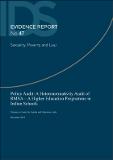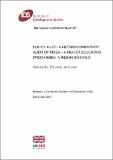| dc.contributor.author | Nirantar | |
| dc.date.accessioned | 2013-12-20T11:18:24Z | |
| dc.date.available | 2013-12-20T11:18:24Z | |
| dc.date.issued | 2013-12 | |
| dc.identifier.citation | Nirantar (2013) 'Policy Audit: A heteronormativity audit of RMSA -a higher education programme in Indian schools', IDS Evidence Report 47, Brighton: IDS | en_GB |
| dc.identifier.uri | https://opendocs.ids.ac.uk/opendocs/handle/20.500.12413/3278 | |
| dc.description.abstract | How do sexual and gender norms affect school education in India? How do schools construct these norms? Are state policies and programmes addressing the linkages between sexuality, gender and school education? These are some of the questions that Nirantar, a Centre for Gender and Education, has been engaging with as part of its mandate to ensure that education is empowering for those marginalised because of gender, caste, sexuality and other dimensions of power.
This report shares the findings of a sexuality and gender audit of a national1 government programme to strengthen secondary school education in India (ie the last four years of schooling). The programme is titled the Rashtriya Madhyamik Shiksha Abhiyan (RMSA), a scheme for universalisation of access to and improvement of quality at the secondary stage.2 Since universalisation of elementary education has become a constitutional mandate,3 the goal of the RMSA scheme is to achieve universal secondary education. Its vision is to make quality education available and affordable to all young persons aged 14–18. RMSA aims to enhance access, quality and equity as they relate to secondary education, with a focus on marginalised young people such as girls, Dalits,4 Muslims and those who have disabilities.This report contributes to a new and emerging area of knowledge – and demonstrates how development policy and programme audits through the lens of sexuality and gender can be undertaken. This is an important and challenging area because, as we see in the case of RMSA, development policies and programmes tend not even to mention the word ‘sexuality’, while being replete with constructions of sexuality and with implicit or explicit messages about the need to be disciplined and to control one's desires. Such messages conflict with ground-level realities and have grave implications for the lives of those who are seen to break sexual and gender norms. | en_GB |
| dc.description.sponsorship | DFID | en_GB |
| dc.language.iso | en | en_GB |
| dc.publisher | Institute of Development Studies (ID) | en_GB |
| dc.relation.ispartofseries | Evidence Report;47 | |
| dc.rights.uri | http://creativecommons.org/licenses/by/3.0/ | en_GB |
| dc.subject | Education | en_GB |
| dc.subject | Gender | en_GB |
| dc.title | Policy Audit: A heteronormativity audit of RMSA -a higher education programme in Indian schools | en_GB |
| dc.type | IDS Evidence Report | en_GB |
| dc.rights.holder | Institute of Development Studies (IDS) | en_GB |
| dc.identifier.ag | OT/11009/6/2/2/222 | |
| dc.identifier.team | Knowledge Technology and Society | en_GB |



